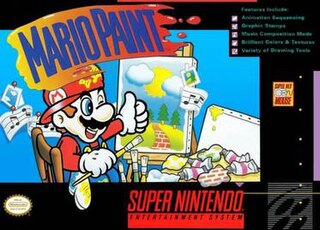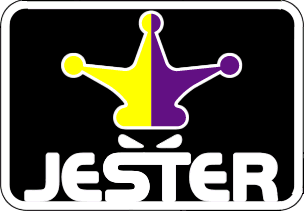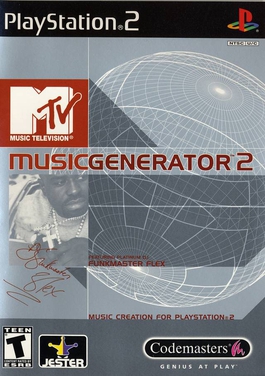
The 3DO Interactive Multiplayer, also referred to as simply 3DO, is a home video game console developed by The 3DO Company. Conceived by entrepreneur and Electronic Arts founder Trip Hawkins, the 3DO was not a console manufactured by the company itself, but a set of specifications, originally designed by Dave Needle and Robert J. Mical of New Technologies Group, that could be licensed by third parties. Panasonic produced the first models in 1993, and further renditions of the hardware were released in 1994 by GoldStar, and in 1995 by Sanyo.
A video game publisher is a company that publishes video games that have been developed either internally by the publisher or externally by a video game developer.
Video game music is the soundtrack that accompanies video games. Early video game music was once limited to sounds of early sound chips, such as programmable sound generators (PSG) or FM synthesis chips. These limitations have led to the style of music known as chiptune, which became the sound of the first video games.
An audio game is an electronic game played on a device such as a personal computer. It is similar to a video game save that there is audible and tactile feedback but not visual.
Video game development is the process of developing a video game. The effort is undertaken by a developer, ranging from a single person to an international team dispersed across the globe. Development of traditional commercial PC and console games is normally funded by a publisher and can take several years to reach completion. Indie games usually take less time and money and can be produced by individuals and smaller developers. The independent game industry has been on the rise, facilitated by the growth of accessible game development software such as Unity platform and Unreal Engine and new online distribution systems such as Steam and Uplay, as well as the mobile game market for Android and iOS devices.

Mario Paint is a video game developed by Nintendo and Intelligent Systems and published by Nintendo for the Super Nintendo Entertainment System in 1992. It is packaged with the SNES Mouse peripheral.
Game programming, a subset of game development, is the software development of video games. Game programming requires substantial skill in software engineering and computer programming in a given language, as well as specialization in one or more of the following areas: simulation, computer graphics, artificial intelligence, physics, audio programming, and input. For multiplayer games, knowledge of network programming is required. In some genres, e.g. fighting games, advanced network programming is often demanded, as the netcode and its properties are considered by players and critics to be some of the most important metrics of the game's quality. For massively multiplayer online games (MMOGs), even further knowledge of database programming and advanced networking programming are required. Though often engaged in by professional game programmers, there is a thriving scene of independent developers who lack a relationship with a publishing company.

The Codemasters Software Company Limited is a British video game developer based in Southam, England, which is a subsidiary of American corporation Electronic Arts. Founded by brothers Richard and David Darling in October 1986, Codemasters is one of the oldest British game studios, and in 2005 was named the best independent video game developer by magazine Develop.

Datel is a UK-based electronics and game console peripherals manufacturer. The company is best known for producing a wide range of hardware and peripherals for home computers in the 1980s, for example replacement keyboards for the ZX Spectrum, the PlusD disk interface and the Action Replay series of video game cheating devices.
The following outline is provided as an overview of and topical guide to video games:

Robert J. "RJ" Mical is an American computer programmer and hardware designer who has primarily worked in video games. He is best known for creating the user interface, Intuition, for Commodore's Amiga personal computer (1985), contributing to the design of the Amiga hardware, and co-designing, with Dave Needle, the Atari Lynx color handheld (1989) and the 3DO Interactive Multiplayer (1993).

Tim Wright, alias CoLD SToRAGE, is a Welsh video game music composer most known for his work in video game soundtracks such as Shadow of the Beast II, Agony, Lemmings, Wipeout and Colony Wars.

TOCA: Touring Car Championship is a 3D racing video game licensed by series organisers TOCA, and developed and published by Codemasters for the PlayStation and Microsoft Windows platforms in 1997-1998. It was re-released by Codemasters for the Game Boy Color in 2000. It was the first entry in the eponymous series and was followed by TOCA 2 Touring Cars in 1998. The player takes control of a driver who races for one of the eight works teams that contested the 1997 British Touring Car Championship against fifteen AI competitors on one of the nine championship circuits. A championship mode is available for players with the objectives of earning points to continue competing and unlocking new features.
Brian Lara Cricket is a series of six cricket video games that are endorsed by the West Indian cricketer Brian Lara and published by Codemasters.
Ever since Pole Position in 1982, Formula One (F1) has always played a part of the racing genre in video games. Early Formula One games were typically arcade racing games, before Formula One Grand Prix (1991) popularized Formula One racing simulations on home computers.
World Rally Championship is a rally racing video game series. To date, three series of video games with the official license have been released.

Jester Interactive is a video game developer based in Flintshire, Wales in the United Kingdom. It was founded in 1997 as a trading arm of Morgan Computing Limited. It would later trade under the name Jester Interactive Limited, and after going into administration in 2003, it would re-emerge as Jester Interactive Publishing Limited.
F1 is a racing video game series by Codemasters under the EA Sports banner since 2021. The series holds the official license of the FIA Formula One World Championship, with the FIA Formula 2 Championship available since the 2019 game. A total of twenty-one games have been released to date, with the series' latest installment, F1 22, released in July 2022.

MTV Music Generator 2 is a music video game developed by Jester Interactive and published by Codemasters for PlayStation 2 in 2001.

Music 2000 is a music video game developed by Jester Interactive and published by Codemasters for the PlayStation and Windows in 1999. It is a sequel to Music from 1998. A sequel, MTV Music Generator 2, was released in 2001.










